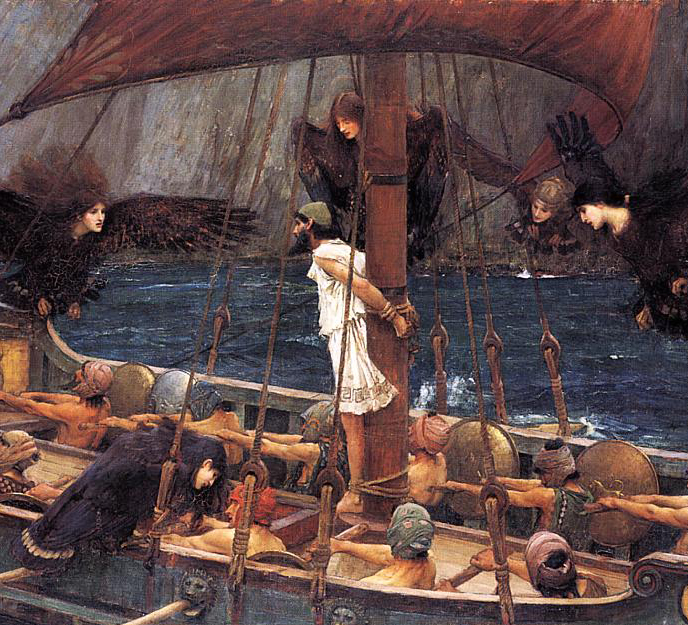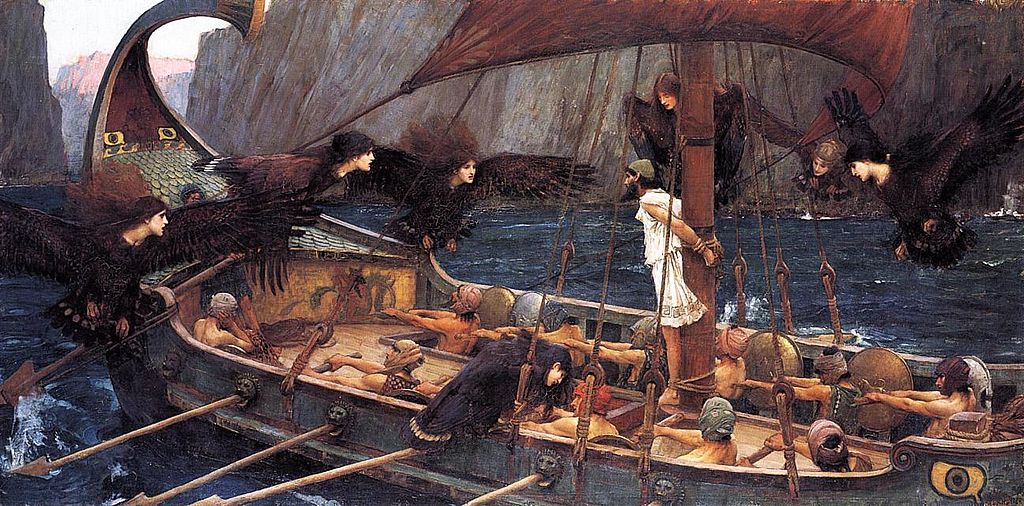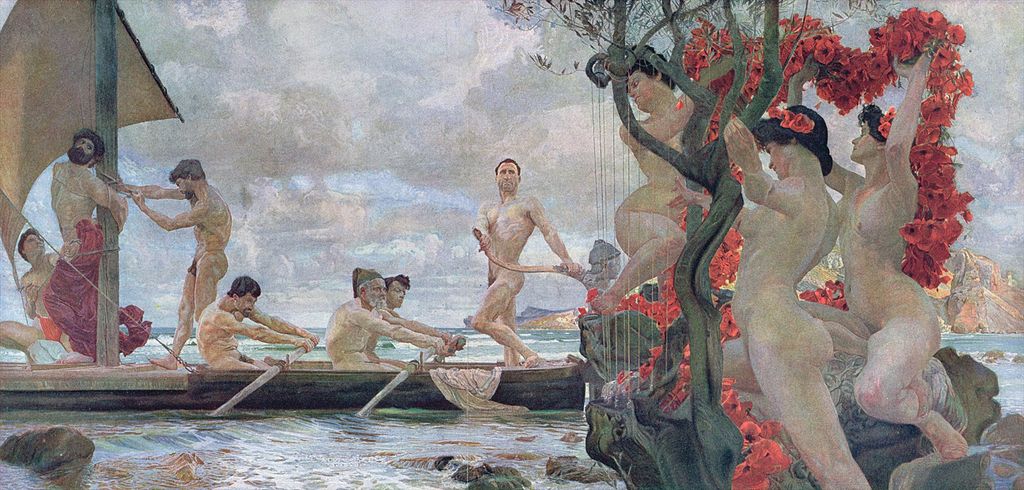2020.09.18 | By Gregory Nagy
§0. This short essay about the Odyssey of “Homer” is a playful experiment. But it is based on an even shorter essay that is quite serious in intent. That essay (Nagy 2020) appears in World Epics, an on-line site edited by Jo Ann Cavallo, whose own work on comparative epic I very much admire. She had asked me to submit a brief essay on the Homeric Odyssey that matches another essay, written by Casey Dué, on the Homeric Iliad. In writing my essay, I found myself in a predicament: it seems to me that I need to say as much about the Iliad as I am saying about the Odyssey. And I am starting to think that such a predicament is inevitable, since my aim in writing my essay on the Odyssey is to provide a companion-piece to the essay by Casey Dué on the Iliad, already mentioned, which as I should now add is another work that I very much admire. But here is a relevant question, which makes the text of my essay here more playful than the text I submitted for World Epics: am I now falling victim to a “siren song”? I leave it to my readers to decide. But at least one thing is for sure: Odysseus clearly avoided the doom of falling victim to the song of his own Sirens.


§1. The ancient Greek epic known as the Homeric Odyssey is symmetrical with another epic, the Homeric Iliad, and it evolved, as an oral tradition, symmetrically with that other epic. This evolution can be traced forward in time, from the “prehistoric” era of the Mycenaean Empire in the second millennium BCE all the way into the historical period of the Greek-speaking world in the sixth century BCE and later. Eventually, a textual tradition started to take hold for the Odyssey as well as for the Iliad, culminating in a definitive text of the two epics, edited by Aristarchus at the Library of Alexandria in Egypt around the middle of the second century BCE. The text of the Iliad and Odyssey as edited by Aristarchus has not survived, but the transmission of that text, including records of textual variants resulting from oral tradition, has ultimately led to the existing editions of “our” Iliad and Odyssey as published by editors in the modern era, that is, starting in the Renaissance and continuing all the way into the present. The surviving “modern” text of our Odyssey is monumental in size, containing over 12,000 verses, nearly matching the even more monumental size of the Iliad, containing over 15,000 verses.
§2. Corresponding to the symmetry of the Odyssey and the Iliad is a symmetrical set of differences between the two main heroes in the narration of each epic, who are Odysseus and Achilles respectively. The differences between these two heroes can be viewed as the most evident reflection of matching differences between the epics that tell their different stories. By contrast with the monolithic Achilles of the Iliad, with his straightforward ideals as a mighty warrior, the Odysseus of the Odyssey is multi-dimensional. As the very first verse of the epic declares, Odysseus is polutropos, that is, ‘many-sided’, capable of literally ‘turning’ (-trop-) his identity into many different identities in response to the many different challenges he faces in the course of his epic adventures.
§3. While Achilles is a paragon of biē or ‘might’ as a warrior, Odysseus excels in mētis or ‘craft’. He is primarily a strategist. Though he is a good fighter, his fighting power succeeds mostly by way of his mental capacity to out-think his enemies, that is, to out-strategize them, and this capacity stands in sharp contrast to the straightforwardness of Achilles, who consistently resists even the semblance of any craftiness.
§4. The Odyssey and the Iliad measure in terms of mētis and biē the greatness displayed by Odysseus and Achilles as the two main heroes of their respective epics. It is by way of his mētis or ‘craft’ that the hero Odysseus in the Odyssey earns the title ‘best of the Achaeans’, corresponding to the same title as earned by Achilles in the Iliad by way of that other hero’s biē. As ‘the best of the Achaeans’, each one of these two epic heroes excels as the very best among all the ‘Achaeans’, who are pictured in epic as the heroic prototypes of Greek-speaking people in the historical period.
§5. The Homeric Odyssey narrates what happened to Odysseus after the end of the Trojan War, yes, but we need to keep in mind that it was Odysseus, not Achilles, who got credit for bringing this prolonged ten-year war to an end. This hero was primarily responsible for the success of the Achaeans in capturing the city of Troy, since it was he who invented the Wooden Horse, sometimes called simply the Trojan Horse, as a ruse that tricked the Trojans into losing their city. This gigantic wooden structure was deceitfully offered as a victory-gift to the Trojans by the Achaeans, who were pretending that they had given up on their siege of Troy. The Trojans dragged the gift horse into their citadel, unaware that Achaean warriors, Odysseus included, were hiding within the hollow insides of the wooden artifact. Come nightfall, the Achaeans emerged from their hiding place and proceeded to conquer the city of Troy. This story is embedded in Rhapsody 8 of the Odyssey, where we also read about the antithesis between Odysseus and Achilles as exponents of craft and might respectively.
§6. The stratagem of the Trojan Horse, which is the definitive epic signature of Odysseus as a master of craftiness, characterizes this hero as a consummate trickster — this is the term used by folklorists to describe a type of hero whose exploits are famed for their craftiness. In terms of the Homeric Greek narrative, this craftiness is mētis.
§7. If, then, we were to measure the heroic greatness of Odysseus as a rival of Achilles in terms of success or failure in the Trojan War, our first impression might be that Odysseus is the “winner” while Achilles is the “loser,” since Troy was captured by way of the mētis or ‘craft’ of Odysseus, not by way of the biē or ‘might’ of Achilles. But first impressions can be deceiving. The fact is, the primary hero of the epic that tells the definitive tale of the war that was fought by the Achaeans at Troy — a city also known by the name of Ilion — turns out to be Achilles, the main character in the Iliad: the very name of the Iliad means ‘the story of Ilion’, that is, ‘the story of Troy’. Although Achilles never succeeded in conquering Troy, the primary epic about Troy features him as the primary hero, not Odysseus. It is Achilles who is celebrated as the greatest hero of the story about the Trojan War, the Iliad — despite the fact that it was Odysseus who would ultimately get credit for the capture of Troy.
§8. It can even be argued that the Odyssey is a story that tells how Odysseus must come to terms with the fact that Achilles is the primary hero of the primary epic about the Trojan War, and that Odysseus and his Odyssey must be secondary to Achilles and his Iliad. In the language of the Homeric Iliad, as we read at verse 413 of Rhapsody 9 in that epic, Achilles himself is quoted as saying that he will win kleos, that is, he will get the ‘glory’ that comes with the performance of the poetry that tells the story of Troy – if he chooses to fight and die an early death in the Trojan War. Achilles also says at verse 413, in the same breath, as it were, that his winning this kleos is at the cost of losing a nostos, which is a ‘safe homecoming’ from war.
§9. Such is the choice that Achilles must make: he must forfeit a nostos in order to win the kleos of his very own epic, which is the Iliad. By contrast, Odysseus cannot have the kleos of the Iliad, and so he must win the kleos of the Odyssey.
§10. But the only way for Odysseus to get the kleos of the Odyssey is to “get over it,” that is, to get over the fact that he cannot be the primary hero of the story about Troy, since Achilles will always be the primary hero of the kleos or poetic ‘glory’ of such a story, which is the story of the Iliad. (In using the expression “get over it,” I draw my inspiration from a most relevant essay by Keith DeStone 2016.09.28, listed in the Bibliography.) Odysseus must therefore become the primary hero of nostos, which is not only a ‘safe homecoming’ but also a song about a safe homecoming. And that song is a kleos in its own right. The kleos of Odysseus must be his nostos.
§11. Unlike Achilles, however, who must choose between kleos and nostos, Odysseus will have both. He will have a nostos, because he will ultimately succeed in coming back home from Troy to Ithaca, but he will also have the kleos or ‘glory’ of the song that we know as the Homeric Odyssey.
§12. All this is not to say, however, that Odysseus will be “having his cake and eating it too,” since he must ultimately lose the kleos that comes primarily from the Iliad in order to win the kleos that can come only from the Odyssey, which is the ultimate song about nostos as a ‘safe homecoming’. That is why, in the story of the Song of the Sirens in Odyssey 10, the great temptation for Odysseus is to interrupt his sea voyage on the way back home by stopping at the Island of the Sirens and listening to their siren songs. These singers promise to sing for him all manner of stories, including the story of Troy. Here is my working translation of what they promise to Odysseus (Odyssey 10.184–191):
|184 Come here, Odysseus, you of many riddling words, you great glory to the Achaean name, |185 stop your ship so that you may hear our two voices. |186 No man has ever yet sailed past us with his dark ship |187 without staying to hear the sweet sound of the voices that come from our mouths, |188 and he who listens will not only experience great pleasure before homecoming but will also be far more knowledgeable than before, |189 for we know [idmen] everything that happened at Troy, that expansive place, |190 – all the sufferings caused by the gods for the Argives [= Achaeans] and Trojans |191 and we know [idmen] everything on earth, that nurturer of so many mortals – everything that happens.
§13. The two Sirens — there are only two of them in our Odyssey — declare here that they know everything in general — but they also declare that they know everything about the Trojan War in particular. By knowing everything, they are like the Muses. The repeated word idmen ‘we know’ at verses 189/191 is comparable to what “Homer” says to the Muses at verse 485 of Iliad 2: iste te panta ‘you know everything’. Moreover, by knowing everything about the Trojan War, the Sirens are like the Muses of the Iliad. It may be said, then, that the Sirens are the false Muses of the Iliad. (For a fuller exposition of the point I am making here, I refer to my commentary on Odyssey 12.184–191 in Nagy 2017.)
§14. If Odysseus had interrupted his sea voyage on his way back home and had stayed with the Sirens, listening to their never-ending song, he would never have got over the Iliad and would therefore never have succeeded in achieving his own Odyssey, which was, at this point in the story, still in the making.
§15. Sadly, however, the success of the hero Odysseus in winning a safe return home from Troy to Ithaca is matched by his failure to achieve a corresponding success in bringing back home the companions whom he had led away from home to fight in the Trojan War. All of these companions will have lost their lives during the journey back home after the capture of Troy.
§16. And the failures of Odysseus are compounded in the course of his sea voyage back home. A prime example is what happens when he finds himself trapped inside the cave of the monstrous Cyclops named Polyphemus: Odysseus manages to save his own life — and the lives of those companions who had survived up to this point in the story — by denying his heroic identity, calling himself a false name, Nobody (Outis). This way, Odysseus tricks the Cyclops, since the monster stupidly utters this false name as he shouts out to his fellow Cyclopes to come and take vengeance on Odysseus after our trickster has succeeded in blinding him. When the other Cyclopes shout back and ask Polyphemus who has harmed him, the monster replies with another shout: “nobody has harmed me!” So, the trick of Odysseus is a success in one way, yes, since he has managed to win back his life, which he had almost lost at this point. But this same trick is also a heroic failure, since Odysseus has proclaimed himself to be a “nobody,” thus canceling the epic fame that he has earned by way of his deeds up to this point — including the greatest of all his heroic deeds, the capture of Troy in the Trojan War. Now Odysseus will have to build himself up again as hero, starting at point zero, which was the dark cave of Polyphemus.
§17. Eventually, however, Odysseus achieves a measure of personal success in his own epic, that is, in the Homeric Odyssey. He survives all the mortal dangers he encounters in the course of his countless adventures while traveling back home to Ithaca from Troy, and, once he gets home, he takes vengeance on all the degenerate aristocrats of Ithaca who were courting his wife Penelope while insolently occupying his palace during his twenty-year absence. Killing them all, Odysseus wins back the love of Penelope and restores himself as king of Ithaca, aided by his son and his father. This personal epic success of Odysseus, which is his Odyssey, is analyzed at length in three chapters of my book The Ancient Greek Hero in 24 Hours (Nagy 2013), “Hours” 9 10 11, which are respectively 42 + 50 + 64 paragraphs in length – and which can be summarized here within the space of a single paragraph. The very idea that such an extreme summary is now even possible for me to attempt – something I have never in my life ever attempted before – only goes to show that the story of Odysseus, however complex as well as lengthy it turns out to be, owes its eventual status as an epic to its symmetrical evolution with the contrasting story of Achilles in the Homeric Iliad.

Bibliography
DeStone, K. 2016.09.28. “Getting over Odysseus.” Classical Inquiries. https://classical-inquiries.chs.harvard.edu/getting-over-odysseus/.
Nagy, G. 1979/1999. The Best of the Achaeans: Concepts of the Hero in Archaic Greek Poetry. Baltimore. http://nrs.harvard.edu/urn-3:hul.ebook:CHS_Nagy.Best_of_the_Achaeans.1999.
———. 2013. The Ancient Greek Hero in 24 Hours. Cambridge MA. http://nrs.harvard.edu/urn-3:hul.ebook:CHS_NagyG.The_Ancient_Greek_Hero_in_24_Hours.2013.
———. 2017. “A Sampling of comments on the Iliad and Odyssey.” http://nrs.harvard.edu/urn-3:hlnc.essay:Nagy.A_Sampling_of_Comments_on_the_Iliad_and_Odyssey.2017.
———. 2020. “Homer’s Odyssey.” World Epics. https://edblogs.columbia.edu/worldepics/project/homer-odyssey/
